 First edition | |
| Author | Paul Goodman |
|---|---|
| Subject | Autobiography |
| Published | 1966 (Brussel & Brussel) |
| Pages | 257 pp. |
| OCLC | 284500 |
| LC Class | PS3513 O53 F5 |
Five Years is an autobiographical collection of Paul Goodman's notebooks between 1955 and 1960.
 First edition | |
| Author | Paul Goodman |
|---|---|
| Subject | Autobiography |
| Published | 1966 (Brussel & Brussel) |
| Pages | 257 pp. |
| OCLC | 284500 |
| LC Class | PS3513 O53 F5 |
Five Years is an autobiographical collection of Paul Goodman's notebooks between 1955 and 1960.
The entries in his original journals were modified for publication. The original journals were acquired from Goodman's wife in 1989 and are held at Harvard University's Houghton Library. [1]

Paul Goodman (1911–1972) was an American writer and public intellectual best known for his 1960s works of social criticism. Goodman was prolific across numerous literary genres and non-fiction topics, including the arts, civil rights, decentralization, democracy, education, media, politics, psychology, technology, urban planning, and war. As a humanist and self-styled man of letters, his works often addressed a common theme of the individual citizen's duties in the larger society, and the responsibility to exercise autonomy, act creatively, and realize one's own human nature.

Compulsory Miseducation is a critique of American public schools written by Paul Goodman and published by Horizon Press in 1964. Already established as a social critic of American society and the role of its youth in his previous book Growing Up Absurd (1960), Goodman argues in Compulsory Miseducation against the necessity of schools for the socialization of youth and recommends their abolition. He suggests that formal education lasts too long, teaches the wrong social class values, and increasingly damages students over time. Goodman writes that the school reflects the misguided and insincere values of its society and thus school reformers should focus on these values before schools. He proposes a variety of alternatives to school including no school, the city or farm as school, apprenticeships, guided travel, and youth organizations. Reviewers complimented Goodman's style and noted his deliberate contrarianism, but were split on the feasibility of his proposals. Goodman's book was a precursor to the work of deschooling advocate Ivan Illich.
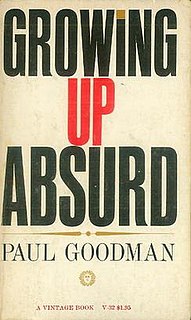
Growing Up Absurd is a 1960 book by Paul Goodman on the relationship between American juvenile delinquency and societal opportunities to fulfill natural needs. Contrary to the then-popular view that juvenile delinquents should be led to properly regard society and its goals, Goodman argued that young American men were justified in their disaffection because their society lacked the preconditions for growing up, such as meaningful work, honorable community, sexual freedom, and spiritual sustenance.

Excellent Sheep: The Miseducation of the American Elite and the Way to a Meaningful Life is a 2015 book of social criticism on the role of elite colleges in American society written by William Deresiewicz and published by Free Press. Deresiewicz addresses the pressure of succeeding under which students are put by their parents and by society, considering more particularly the ones that are planning to attend Ivy League universities.

The Empire City is a 1959 epic novel by Paul Goodman.

Communitas: Means of Livelihood and Ways of Life is a 1947 book on community and city planning by Percival and Paul Goodman. Presented as an illustrated primer on how city planning affects socioeconomic order and citizens' empowerment to better their communities, the book reviews historical and modern approaches to urban planning before proposing three of the Goodmans' own provocative community paradigms.

The Community of Scholars is a 1962 book about higher education by Paul Goodman with his observations on its function and proposals for its future.
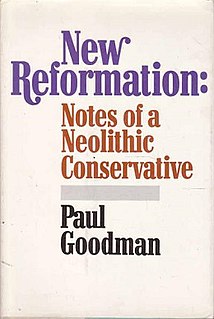
New Reformation: Notes of a Neolithic Conservative is a 1970 book of social commentary by Paul Goodman best known as his apologia pro vita sua before his death two years later.
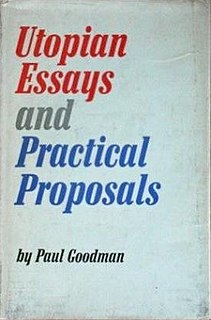
Utopian Essays and Practical Proposals is a 1962 book of essays on social issues by Paul Goodman.
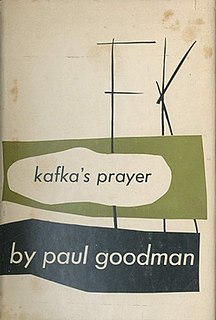
Kafka's Prayer is a 1947 book-length analysis of the novelist Franz Kafka and his works by Paul Goodman. Using Freudian and Reichian psychoanalysis, Goodman assesses the philosophical and religious significance of Kafka's aphoristic statements and three novels. He levels an anarchist societal critique against social institutions borne from neuroticism. Goodman used the book, published by Vanguard Press, to grapple with the religious implications of psychoanalysis and transition from a career writing on Jewish concerns to a period that would culminate in his collaboration on the founding work of the gestalt therapy movement.
Free the Children: Radical Reform and the Free School Movement is the first book-length account of the free school movement written by Allen Graubard and published by Pantheon Books in 1972.
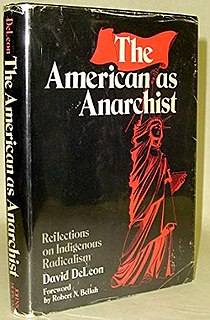
The American as Anarchist: Reflections on Indigenous Radicalism is a history book about the role of Protestantism, capitalism, and American geography in developing American libertarian sentiment.
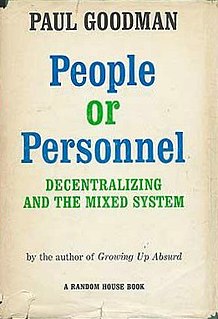
People or Personnel is a critique of centralized power written by Paul Goodman and published by Random House in 1965.

Speaking and Language: Defence of Poetry is a book of criticism by Paul Goodman that blames academic, structured approaches to linguistics for diminishing the role of creativity and spontaneity in speaking and human nature.
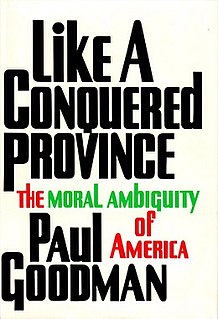
Like a Conquered Province: The Moral Ambiguity of America is a book of Paul Goodman's Massey Lectures for the Canadian Broadcasting Corporation on topics of American pathologies, in particular, citizens not taking responsibility for the consequences of inequality and harmful technologies. He advocates for decentralized alternatives to existing institutions that give greater control to individuals.

Little Prayers and Finite Experience is a book of prose and poetry by Paul Goodman.

Collected Poems is a book of Paul Goodman's collected poetry, edited by his literary executor Taylor Stoehr and introduced by George Dennison.
Paul Goodman described himself as a man of letters but foremost a poet. He published several poetry collections in his life, including The Lordly Hudson (1962), Hawkweed (1967), North Percy (1968), and Homespun of Oatmeal Gray (1970). His Collected Poems (1973) were published posthumously.
Paul Goodman's oeuvre spanned fiction, poetry, drama, social criticism, psychoanalytic theory, and literary analysis. While he viewed himself as a man of letters, he prized his stories and poems above his other work. To Goodman, writing was "his vice" or "way of being in the world".
Taylor Stoehr (1931–2013) was an American professor and author. He edited several volumes of Paul Goodman's work as his literary executor.